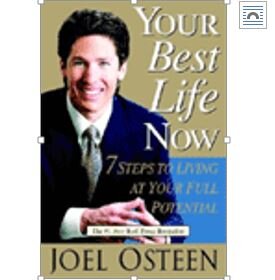Why would someone be foolish enough to criticize the pastor of reportedly the largest church in the United States?
Joel Osteen continues to grow in popularity, his messages are broadcast on TV, and now he has written a best seller Your Best Life Now. (Apparently the book has already shot ahead of Rick Warren’s Purpose Driven Life.)
This title is a good summary of the overall bent of his message. Therein lies my problem since truth floats my boat. I am disturbed when the biblical message is truncated, when theological concepts like sin and judgment are minimized or redefined from some type of politically correct perspective, or when someone waffles on the fundamentals of the faith at some critical juncture. Look at the millions of dollars being pumped into his ministry by gullible followers. Such a huge investment needs to be closely examined.
Personally I have had only a little exposure to Pastor Osteen’s ministry. But those snapshots have raised red flags for me. I saw him and his wife interviewed on the Larry King show. He was asked some very direct questions that related to the exclusivity of the Christian gospel as being essential for someone’s salvation. In other words, will people of other faiths who are sincere in what they profess and practicing their religion from a strong moral basis actually be consigned to hell by a loving God? The answer was evasive at best and probably misleading – with an attempt at a positive spin. Osteen was obviously uncomfortable discussing the concept of judgment and condemnation.
His power of positive thinking approach strikes me as directly in line with the likes of Robert Schuller and perilously close to the heart of the prosperity gospel – which not surprisingly would appeal to so many people. Let’s dismiss our sin as just problems and mistakes which we can put behind us by taking a forward looking stance at all the goodies God wants to give us today. The concepts of repentance and commitment and suffering and bearing one’s cross are conspicuous by their absence.
That is how a book can deliver many good points of truth and practical counsel and yet at its core not be entirely consistent with the biblical perspective. Error is never devoid of truth – it is just truth out of balance or adulterated. The better the counterfeit, the more people are deceived by the message. (Let’s be honest… his ever-present smile is a bit spooky, don’t you think?)
I would refer you to a helpful critical review of Osteen’s book by Daryl Wingerd:
On page 5 Osteen explains that this quest for financial and material increase is actually pleasing to God. He claims that “God wants to pour out ‘His far and beyond favor.’ God wants this to be the best time of your life” (emphasis mine). You see, according to Joel Osteen, God particularly wants you to experience His goodness, in physical, financial, and social ways, here and now. Hence, the title of the book, Your Best Life Now. . .
On an even more important note, the words represented here by Joel Osteen as “Scripture,” the words that set the theme for his entire book, do not reflect the true meaning of Ephesians 2:7. Osteen interprets them to mean that God wants to do something tangible and earthly, here and now, for all people. But Paul’s words in Ephesians 2:7, when properly understood in their context, tell us plainly that God has already done what He purposed to do, for believers alone (not for all people), that the primary benefits of His work are spiritual (not physical or earthly), and that they will be experienced in their fullest measure “in the ages to come” (not here and now). . .
At the very core of Joel Osteen’s teaching is the idea that godliness is a means of gain. He wants you to believe that as you grow and mature as a Christian, as you endure the trials that come into your life, as your faith is strengthened, and as you become more godly, you can expect God’s blessings to flow your way. But when Paul wrote of those “who suppose that godliness is a means of gain,” he was not praising them. He was informing Timothy that such men were “deprived of the truth” and advocating “a different doctrine” (1 Tim. 6:1-5). And Paul follows his rebuke by explaining the true meaning of contentment. Read 1 Timothy 6:6-8 once again . . .
Think of the implications of Osteen’s teaching for Christians who live in places like Haiti, the Sudan, or other poverty-stricken parts of the world. Can these brothers and sisters in Christ experience God’s blessing even though they will likely never be wealthy? Should they not thankfully rejoice in their difficulties (cf. 1 Thess. 5:16-18)? Should they not be comforted by the knowledge that God in His providence is causing their affliction in order to refine them toward godliness in the midst of poverty? Or are they to believe that their third-world status is the result of having only third-rate faith?
May the Bereans among us faithfully do their job of examining every popular message of our culture against the unchanging, timeless, objective standard of the revealed Word of God. Is Your Best Life Now truly in the tradition of the words of Christ and His apostles?

